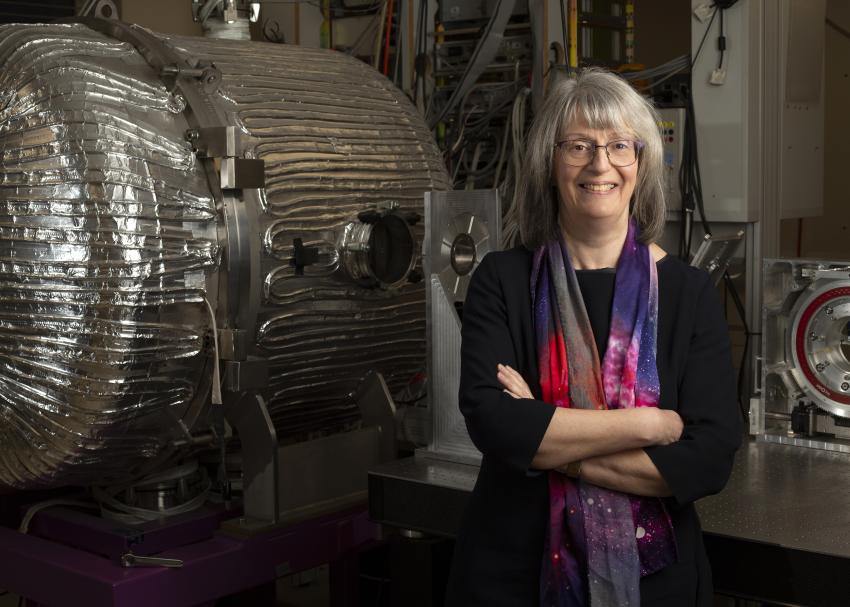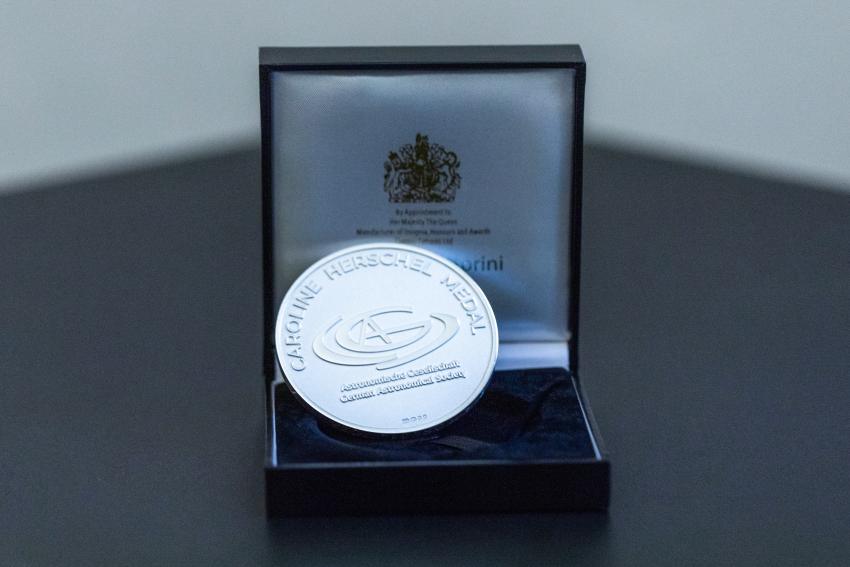Professor Gillian Wright CBE FRSE, Director at the UK Astronomy Technology Centre in Edinburgh, is the first UK winner of the Caroline Herschel Medal, a joint award from the Royal Astronomical Society and the German Astronomical Society (Astronomische Gesellschaft, AG). Professor Wright wins the medal in recognition of her leadership of the development of the Mid-Infrared Instrument (MIRI) on the James Webb Space Telescope (JWST), in operation since the summer of 2022.
The Medal was launched in 2021 by the UK Government in honour of former German Chancellor Angela Merkel. It commemorates Caroline Herschel, who was a distinguished astronomer working in the late eighteenth and the first half of the nineteenth century. Born in Hanover in Germany, she moved to the UK with her brother William, who was the first president of the RAS in 1820, discovered eight comets, revised and greatly improved catalogues of stars, and of clusters and nebulae. The medal recognises her legacy, and the deep and enduring scientific links between Germany and the UK. It is awarded to outstanding women astronomers, alternating between the two countries in each successive year.
For more than 20 years Professor Wright has been the European Principal Investigator leading a consortium of institutes across Europe that developed MIRI in partnership with NASA's Jet Propulsion Laboratory. This has been a leadership role of considerable complexity requiring excellent scientific, management and interpersonal skills. Her team consists of around 100 people based in ten European countries.
MIRI operates in infrared light beyond the red end of the visible spectrum. Its capabilities including imaging, coronagraphy (using a mask to hide a star to look at its surroundings), high precision time series measurements, and both low and moderate resolution spectroscopy (dispersing light across its constituent colours). With its significant advance in sensitivity and extraordinary angular resolution, the performance of MIRI on JWST will be unsurpassed in imaging and spectroscopy at these wavelengths for the foreseeable future.
Prof. Wright said: “I am deeply honoured to be awarded the Caroline Herschel medal and it is very special to be the first UK recipient. From the very beginning MIRI has been an international collaboration and I’d like to thank the whole team for their support and many contributions.”
RAS President Prof. Mike Edmunds said: “Gillian is a global scientific leader in astronomy. She worked tirelessly to bring MIRI to fruition, and it is now delivering unparalleled advances in our scientific understanding of the universe. On behalf of the Royal Astronomical Society, I would like to offer her my warmest congratulations as the first UK winner of the Caroline Herschel Medal.”
AG President Prof. Michael Kramer said: “Seeing the images produced by MRI on JWST is truly impressive. Recognising Gillian as a leader making these possible is not only timely but also entirely appropriate. We are extremely happy that Gillian is the second winner of this joint award, and in name of the AG, I congratulate Gillian not only on the award but also on her great achievements.”
Mario Brandenburg, Parliamentary State Secretary to the German Federal Minister of Education and Research, declared: “Looking out into the universe has fascinated people for thousands of years. The fact that we can now understand it much better is in part thanks to Professor Wright’s important work on the development of MIRI. I am delighted also that the University of Cologne and the Max Planck Institute for Astronomy in Heidelberg have provided important contributions in the instrument’s development. It is right and important to conduct research on the big questions internationally and across boundaries. I would like to thank Professor Wright warmly for her work and congratulate her on this well-deserved award.”
Minister of State at the new UK Dept of Science Innovation & Technology George Freeman said:
“The UK and Germany enjoy deep and time-honoured research ties, which we will continue to build on to address the global challenges of our time.
“Supported by the UK Government, the Caroline Herschel Medal highlights the remarkable contributions of women to the field of astronomy and recognises outstanding researchers in our two countries. I wholeheartedly congratulate Prof. Gillian Wright as the UK’s first recipient of this prestigious award.”
Jill Gallard CMG, His Majesty’s Ambassador to Germany, said:
“The UK and Germany are each other's second most important research partners globally, with more than 72,000 co-authored publications. I am glad we have this award to celebrate these strong science and research ties between our two countries and I hope that the examples of brilliant scientists such as Prof. Wright will inspire further women to pursue science careers.”
Professor Mark Thomson, Science and Technology Facilities Council Executive Chair, said: “Gillian is a very worthy winner of this prestigious award for her exemplary work and leadership role on JWST. Since it started science operations last year the images and data from MIRI have already expanded our understanding of the universe. Alongside MIRI she is also leading some of the most exciting and innovative projects in astronomy as director at STFC’s UK Astronomy Centre in Edinburgh.”
Dr Paul Bate, CEO of the UK Space Agency, said: “Huge congratulations to Professor Gillian Wright, on behalf of myself and the entire UK Space Agency, for this well-deserved achievement.
“Gillian has dedicated more than 20 years of her life to the development of MIRI, which has helped the James Webb Space Telescope bring us some of the clearest, deepest and most awe-inspiring images of space ever seen. These images, and the people that made them possible, will be remembered for decades as scientists continue to analyse their data, shedding light on the most fundamental questions of the universe, and providing inspiration for the next generations of scientists, engineers and space professionals.”
Prof. Wright will receive the Medal at a special ceremony at the German Ambassador to the UK’s residence in London in April. In 2024 it will be the turn of a woman astronomer in Germany to receive the Medal, and nominations for this will open later this year.
Media contacts
Dr Robert Massey
Royal Astronomical Society
Mob: +44 (0)7802 877699
press@ras.ac.uk
Gurjeet Kahlon
Royal Astronomical Society
Mob: +44 (0)7802 877 700
press@ras.ac.uk
Dr Janine Fohlmeister
Astronomische Gesellschaft
Tel: +49 331 7499 802
pressofficer@astronomische-gesellschaft.de
Jake Gilmore
Science and Technology Facilities Council
jake.gilmore@stfc.ukri.org
Science contact
Prof. Gillian Wright
UK Astronomy Technology Centre
gillian.wright@stfc.ac.uk
Notes for editors
The Caroline Herschel medal celebrates talented German and British women in astronomy. Prof. Gillian Wright’s leadership in developing MIRI for the James Webb Space Telescope serves as an inspiration for women to pursue exciting and rewarding careers in science. The UK government is committed to attracting and retaining women in STEM. The medal was launched in summer 2021 in honour of Chancellor Merkel during her visit to the UK, and this will be the first time the medal has been awarded to a British scientist. It is funded by the Department for Science, Innovation and Technology (DSIT), supported by the British Embassy in Germany, and administered by the Royal Astronomical Society and the German Astronomical Society.
The Royal Astronomical Society (RAS), founded in 1820, encourages and promotes the study of astronomy, solar-system science, geophysics and closely related branches of science. The RAS organises scientific meetings, publishes international research and review journals, recognises outstanding achievements by the award of medals and prizes, maintains an extensive library, supports education through grants and outreach activities and represents UK astronomy nationally and internationally. Its more than 4,000 members (Fellows), a third based overseas, include scientific researchers in universities, observatories and laboratories as well as historians of astronomy and others.
The RAS accepts papers for its journals based on the principle of peer review, in which fellow experts on the editorial boards accept the paper as worth considering. The Society issues press releases based on a similar principle, but the organisations and scientists concerned have overall responsibility for their content.
Keep up with the RAS on Twitter, Facebook, Instagram, LinkedIn, Mastodon and YouTube.
The German Astronomical Society (Astronomische Gesellschaft, or AG for short), founded in 1863, is the German national professional association for astronomy and astrophysics. The AG promotes activities in science and research, strengthens exchange between its members and supports the dissemination of science to the public and in education. On the international level, the AG represents the German astronomical scientific community in the European Astronomical Society (EAS) and the International Astronomical Union (IAU). The Council of German Observatories is a central body of the AG, acting as the science policy committee, and representing the common interests of all German astronomical institutions vis-à-vis funding agencies, governments, international organisations and other relevant boards and committees. Keep up with the German Astronomical Society on Twitter, and Facebook.
The UK Astronomy Technology Centre (UK ATC) is based at the Royal Observatory in Edinburgh and operated by the UK’s Science and Technology Facilities Council (STFC) and part of UK Research and Innovation (UKRI). The UK ATC designs and builds instruments for many of the world’s major telescopes on land and in space. It also project manages UK and international collaborations, and its scientists carry out observational and theoretical research into questions such as the origins of planets and galaxies.
Current projects include software for the SKAO, the world’s largest radio telescope; instrumentation for both for the Very Large Telescope and the Extremely Large Telescope in Chile and MIRI, one of four scientific instruments on the James Webb Space Telescope, which launched on Christmas Day 2021. Keep up with the UK Astronomy Centre on Twitter, and LinkedIn.



